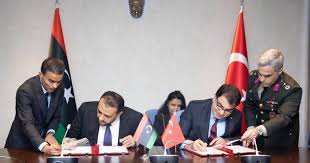
Libya and Turkey have stepped up joint efforts to tackle one of the country’s most persistent post-conflict threats — the deadly remnants of war — following a high-level meeting between the Libyan Mine Action Centre and the Turkish military engineering mission in Tripoli.
The meeting, held on 24 September, focused on strengthening technical and operational cooperation to carry out safe detonation operations and remove explosive remnants of war (ERW) that continue to endanger civilian lives, particularly in heavily populated areas.
According to sources at the Mine Action Centre, discussions centred on targeted clearance operations in Tripoli, Mizdah, and Misrata — regions where unexploded ordnance and other dangerous remnants remain a significant risk to residents.
The Director of the Libyan Mine Action Centre underscored the critical role of this partnership in advancing national safety and stability.
“This cooperation supports peace and stability efforts, enhances the protection of civilians, and develops national mine action capabilities, in line with international standards and humanitarian obligations,” he said.
The collaboration forms part of broader humanitarian initiatives led by the Libyan Mine Action Centre, which is tasked with eliminating remnants of conflict scattered across the country. These remnants, including unexploded mines, shells, and improvised explosive devices, pose a daily threat to communities and hinder reconstruction and development efforts.
The renewed cooperation with Turkey marks a significant step forward in Libya’s ongoing demining and post-conflict recovery work. By combining resources and technical expertise, both sides aim to accelerate clearance operations and build the capacity of Libyan teams to address long-term safety challenges.
As Libya continues to recover from years of conflict, clearing war remnants remains essential to restoring normal life, enabling displaced people to return home, and paving the way for sustainable peace and development.



